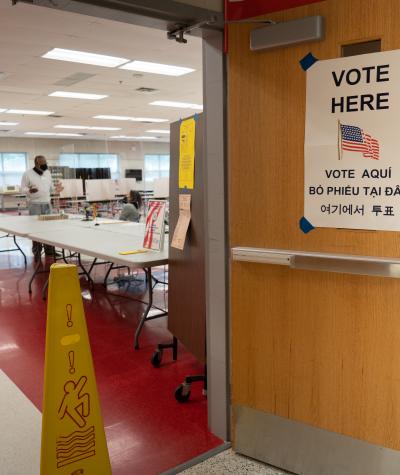This past Election Day, I volunteered as a nonpartisan poll worker (called an “election officer” in Virginia) for the first time. My experience was deeply educational, inspiring and fun. In future years, I hope to continue serving in this role whenever possible, and I would highly recommend anyone with an interest in democracy or the electoral process consider volunteering at least once.
Here’s why.
Elections in the United States are incredibly local affairs. When voting in-person, we usually gather at designated sites directly in our communities – libraries, schools, recreation centers – to cast a ballot and make choices. We may sometimes be voting on issues or candidates at the federal and state level, but the process almost always happens on the ground, in familiar locations right near our homes.
The individuals administering these elections are also our neighbors, family and friends. For the most part, the hundreds of thousands of people who help run voting sites throughout the country are not government employees. They are community members volunteering in a nonpartisan capacity to support the complex logistical machinery of our democracy.
In my case, I was trained in the weeks before Election Day and assigned to join eight other residents of Fairfax County, Virginia, to operate a polling location at the nearby Freedom Hill Elementary School.
We arrived at 5:00 AM on Election Day to swear an oath of impartiality before transforming the school’s gymnasium into a polling place. This included positioning traffic cones to promote smooth voter flow across a basketball court; erecting privacy barriers around the desks where voters filled out their ballots; hanging instructions for requesting all kinds of assistance; booting up the technology we needed throughout the day; and – perhaps most importantly – artfully arranging the all-important “I Voted” stickers by the exit doors.
When the polls opened at 6:00 AM, we divided between four main jobs: greeting voters as they came inside and answering initial questions; using electronic poll pads to check-in community residents and confirm their eligibility to cast a ballot at our specific voting site; providing a blank ballot and instructions on how to actually vote; and standing by the ballot scanning devices to make sure voters knew how to confirm for themselves that their choices were counted.
For the next 13 hours we rotated among these tasks, ultimately helping almost 950 voters cast their ballots in-person on Election Day.
The vast majority of these interactions were routine and quick, while all other circumstances – including individuals looking to participate in same-day voter registration, persons with disabilities who needed extra assistance, or county residents who required directions to their correct voting site at a library a few blocks away – were handled according to the rules in a professional manner.
One of the most enriching features of this experience was getting to observe the faces of our democracy: new citizens and young people casting their first ballots, seniors who let us know they had voted in every election for decades, individuals who recently moved from another state and were getting to know their new community, and entire families with generations of history in the area all voting together.
As nonpartisan poll workers, we never questioned or discussed how these individuals would vote. Our job was just to make sure that they could exercise their freedom to vote as efficiently as possible. Through my volunteering experience, I was able to observe all my colleagues’ commitment to that ideal and their dedication to the impartial administration of our election.
When the polls closed at 7:00 PM, we made sure that everyone already present was able to finish voting. We then began the careful process of shutting down the day’s operation. Most importantly, we generated reports from the ballot scanning devices totaling our site’s election results, which were then sent through a secure chain of custody to Fairfax County Government Center and the Virginia Department of Elections.
We were given clear structures and rules to follow to protect the integrity of this post-election process, and every poll worker had to repeatedly certify the steps they were involved in to ensure accountability. In addition, even as our polling location’s electronic voting totals were transmitted, all the paper ballots on site were preserved and secured to be used for any future review that becomes necessary.
These procedures were remarkably sophisticated. Observing them truly inspires confidence in our system of self-government and the security of our elections. The same goes for every aspect of Election Day. Participating in this microcosm of our democracy was a fantastic way to understand the inner workings of what was happening across Virginia and in similar locations throughout the country.
For these reasons and more, I highly recommend working the polls for a meaningful and rewarding experience. The need for volunteers will continue to grow in future election cycles and helping your community vote is a remarkable way to deepen your participation in democracy. I certainly intend to return moving forward, as well as incorporate the lessons I learned in my work at Campaign Legal Center.

